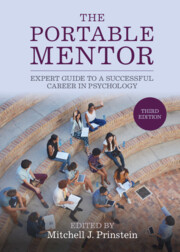Book contents
- The Portable Mentor
- The Portable Mentor
- Copyright page
- Dedication
- Contents
- Figures
- Tables
- Boxes
- Contributors
- Preface
- Acknowledgments
- Part I Applying to Graduate School
- Part II Beginning your Career
- Part III Your Research/Academic Career
- 11 An Open Science Workflow for More Credible, Rigorous Research
- 12 Presenting Your Research
- 13 Publishing Your Research
- 14 Recommendations for Teaching Psychology
- 15 Applying for NIH Grants
- 16 On Being a Woman in Academic Psychology
- Part IV Your Career as a Practitioner
- Part V Your Professional Service Career
- Part VI Your Career After Graduate School
- Index
- References
16 - On Being a Woman in Academic Psychology
from Part III - Your Research/Academic Career
Published online by Cambridge University Press: 21 July 2022
- The Portable Mentor
- The Portable Mentor
- Copyright page
- Dedication
- Contents
- Figures
- Tables
- Boxes
- Contributors
- Preface
- Acknowledgments
- Part I Applying to Graduate School
- Part II Beginning your Career
- Part III Your Research/Academic Career
- 11 An Open Science Workflow for More Credible, Rigorous Research
- 12 Presenting Your Research
- 13 Publishing Your Research
- 14 Recommendations for Teaching Psychology
- 15 Applying for NIH Grants
- 16 On Being a Woman in Academic Psychology
- Part IV Your Career as a Practitioner
- Part V Your Professional Service Career
- Part VI Your Career After Graduate School
- Index
- References
Summary
The goal of this chapter is to offer a candid snapshot of what it’s like to be a woman in modern academic Psychology and Neuroscience. We also hope to generate conversation around shared experiences and provide a vision into a more equitable path forward for women in our field. By academic Psychology, we mean careers focused on research and teaching in the fields of psychological science or neuroscience. We are most directly speaking to careers that are housed in universities, colleges, or research institutes, but of course the issues we discuss are not unique to those places (or even Psychology or academia, more specifically).
- Type
- Chapter
- Information
- The Portable MentorExpert Guide to a Successful Career in Psychology, pp. 303 - 326Publisher: Cambridge University PressPrint publication year: 2022



